Letter Of Sympathy To A Friend
[Your Friend's Name],
I hope this letter finds you in the company of caring friends and family during this difficult time. I can't begin to express how deeply sorry I am for the loss of your [relationship of the deceased]. It's heart-wrenching to imagine the pain and sorrow you must be going through right now.
I want you to know that you are not alone in this journey of grief. As your friend, I am here to offer my heartfelt sympathy, support, and understanding. Please remember that it's okay to feel overwhelmed by emotions and that grieving is a natural process that takes time.
[Deceased's Name] was such a wonderful and [positive traits/qualities] person. I'll always cherish the memories we shared together, and I know that [he/she] had a profound impact on your life as well as the lives of many others. The legacy of love and kindness [he/she] leaves behind will continue to inspire and touch people's hearts.
In times like these, it's essential to take care of yourself. If you ever feel like talking or need a shoulder to lean on, don't hesitate to reach out to me. We can spend time together reminiscing about the beautiful moments or simply be there for each other in silence if that's what you need.
Remember that healing is a gradual process, and it's okay to take all the time you need to grieve and come to terms with this loss. Be gentle with yourself and allow yourself to feel whatever emotions arise without judgment.
In the coming days and weeks, I'll be checking in on you regularly to see how you're doing and to provide any help or support you may need. Whether it's running errands, cooking meals, or simply being there as a listening ear, I'm here for you.
Please take care of yourself and don't hesitate to ask for help if you need it. You are not alone, and we are all here to help you through this challenging time.
Sending you all my love and support,
[Your Name]
Heartfelt Sympathy Letter to a Friend
Subject: Thinking of You During This Difficult Time
Dear [Friend's Name],
I was deeply saddened to hear about your loss. Please know that my thoughts and prayers are with you during this challenging period. I cannot imagine the pain you are feeling, but I am here for you in any way you need.
Remember to take care of yourself and reach out whenever you need support or someone to talk to. Your loved one will always remain in our hearts.
With deepest sympathy,
[Your Name]
Informal Casual Sympathy Email
Subject: My Condolences
Hi [Friend's Name],
I just wanted to reach out and let you know that I'm thinking of you. I'm so sorry for your loss. If you need someone to listen or just hang out with, I'm here for you anytime.
Take care of yourself,
[Your Name]
Sympathy Letter for Serious Illness
Subject: Sending You Strength and Support
Dear [Friend's Name],
I am so sorry to hear about your diagnosis. I know this is a difficult time, but please remember you are not alone. I am here to support you in any way, whether it's accompanying you to appointments or simply being there to talk.
Stay strong and take things one day at a time.
Sincerely,
[Your Name]
Heartfelt Sympathy Letter for Loss of a Loved One
Subject: With Deepest Sympathy
Dear [Friend's Name],
I was heartbroken to hear about the passing of [Deceased's Name]. I hope you find comfort in knowing how much they were loved and cherished by everyone around them. Please lean on me for any help, support, or simply companionship as you navigate this difficult time.
Sending you love and strength,
[Your Name]
Supportive Sympathy Message
Subject: Thinking of You
Dear [Friend's Name],
I just want you to know that I am here for you. Life can be overwhelming, and during times like this, having a friend to lean on makes all the difference. Whenever you need someone, I am just a call away.
Warm regards,
[Your Name]
Sympathy Letter with Encouragement
Subject: Holding You in My Thoughts
Dear [Friend's Name],
I know words cannot take away the sorrow you are feeling, but I hope you find a little comfort in knowing you are loved and supported. Your strength is admirable, and I am confident that, with time, healing will come. I am here for you in any way you need.
With love,
[Your Name]
Why Do You Need a Sympathy Letter to a Friend
- Express empathy and show that you care during difficult times.
- Provide emotional support to someone grieving or facing challenges.
- Strengthen friendships by being present in both good and bad times.
- Serve as a personal, heartfelt gesture that words spoken alone may not convey.
Who Should Send a Letter of Sympathy
- Close friends who know the recipient personally.
- Colleagues or acquaintances in a more formal setting (tone should be adjusted).
- Family friends or anyone with a meaningful relationship with the recipient.
Whom Should Receive a Sympathy Letter
- Friends experiencing personal loss (death, illness, hardship).
- Friends facing serious challenges or life-changing events.
- Anyone who could benefit from emotional support and reassurance.
When to Send a Sympathy Letter
- Immediately following news of a loss or serious event.
- During anniversaries of loss or critical moments when emotional support is needed.
- As ongoing support during prolonged illness or hardship.
Elements and Structure of a Sympathy Letter
- Subject line reflecting concern or empathy.
- Greeting with recipient's name.
- Acknowledge the event or loss.
- Express personal feelings of sorrow or support.
- Offer help or companionship.
- Closing with warm, comforting words.
- Signature with name.
Formatting Guidelines for Sympathy Letters
- Length: Brief and heartfelt; one page is sufficient.
- Tone: Warm, sincere, and compassionate.
- Style: Adjust formality based on relationship.
- Wording: Gentle and supportive, avoid judgment or unsolicited advice.
- Mode of sending: Printed letter or personal email; hand-written notes are especially meaningful.
Tricks and Tips for Writing a Sympathy Letter
- Personalize the letter with anecdotes or shared memories.
- Keep the message empathetic and focused on the recipient’s feelings.
- Avoid clichés or overly generic phrases.
- Offer specific help rather than a general "let me know if you need anything."
- Proofread for clarity and tone to ensure sincerity is conveyed.
Common Mistakes to Avoid in Sympathy Letters
- Using insensitive or dismissive language.
- Being overly long or diverting focus from the recipient.
- Including unsolicited advice or criticism.
- Sending the letter too late after the event.
- Using humor inappropriately unless you know it will comfort the recipient.
After Sending a Sympathy Letter
- Follow up with a call or visit if appropriate.
- Respect the recipient's need for space and time to grieve.
- Offer support over the long term, not just immediately after the loss.
- Keep track of significant dates for continued emotional support.
FAQ About Sympathy Letters to Friends
Q: Is it okay to send a sympathy email instead of a letter?
A: Yes, especially if you cannot deliver a physical letter, but a hand-written note is often more personal.
Q: Should I mention the cause of loss or illness?
A: Only if the recipient is comfortable discussing it; focus on support rather than details.
Q: Can humor be included?
A: Only if you know it will comfort the recipient; otherwise, keep the tone serious and compassionate.
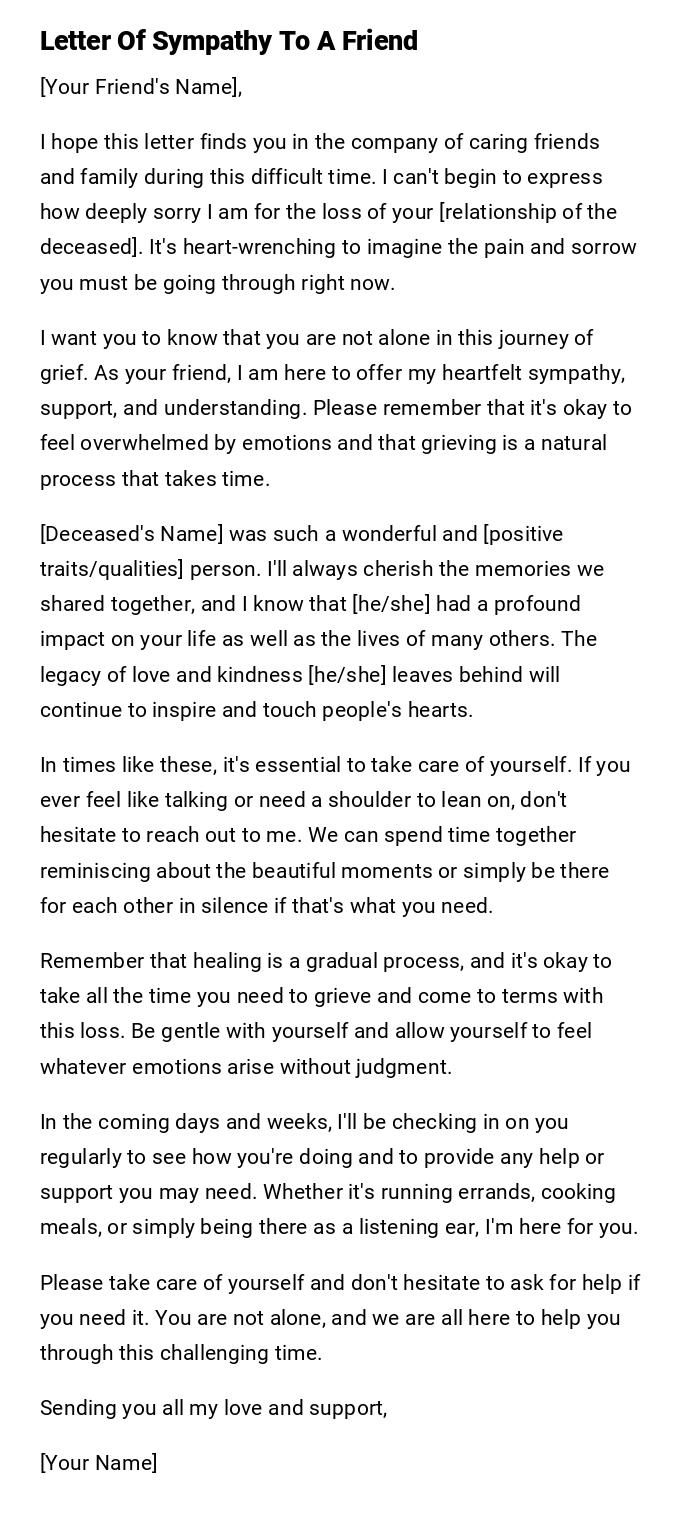
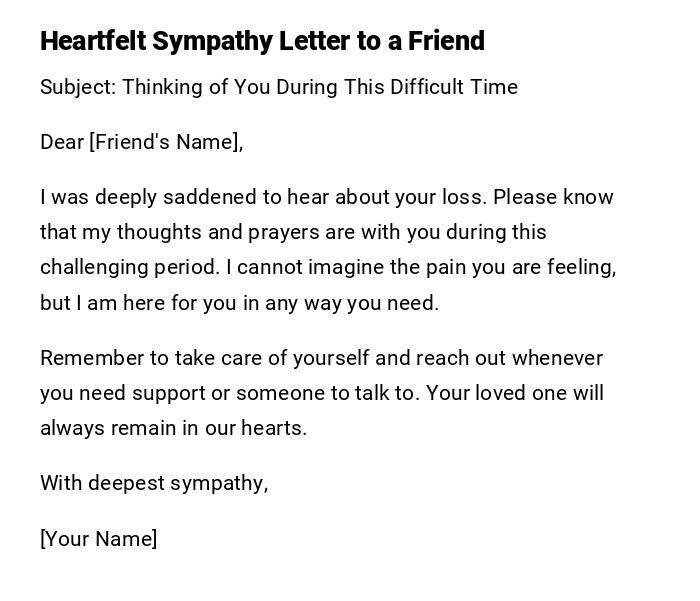
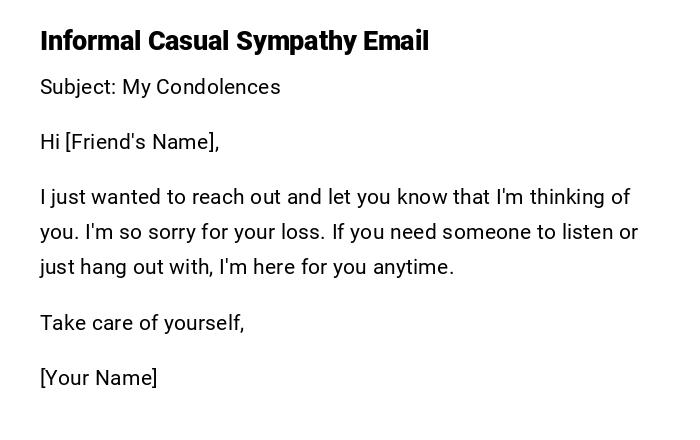
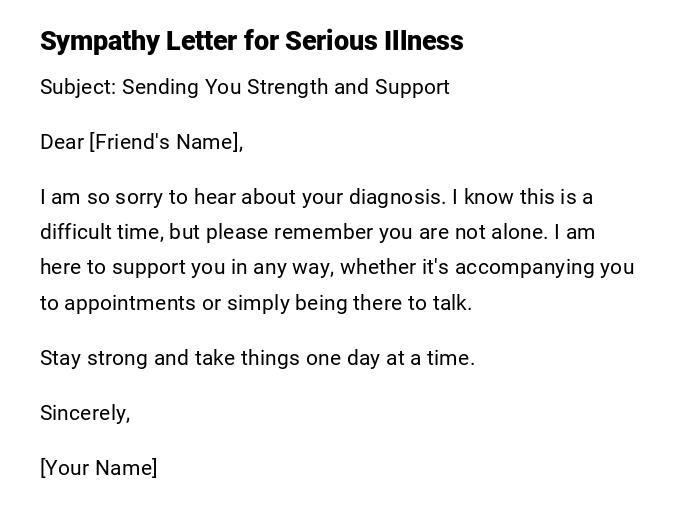
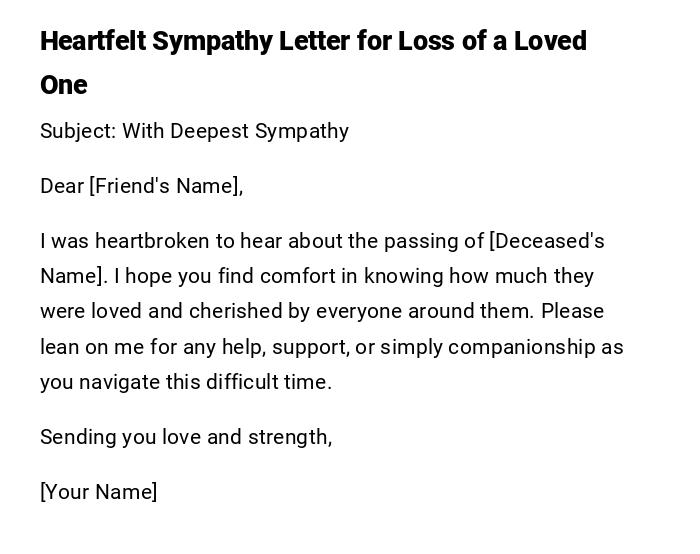
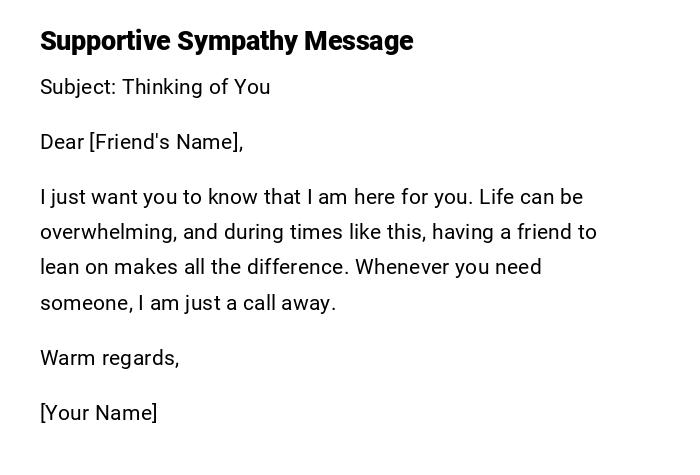
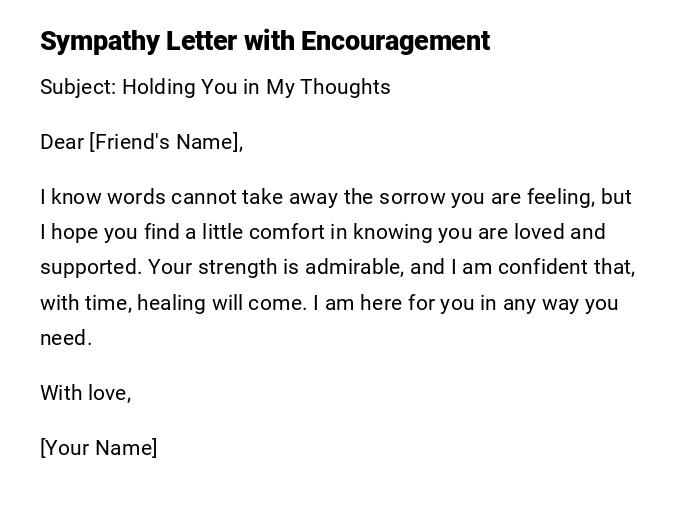

 Download Word Doc
Download Word Doc
 Download PDF
Download PDF